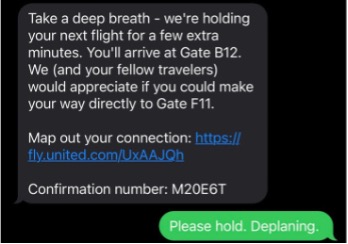My flight leaving Vancouver was delayed.
This meant my connection through Chicago would be tight. After a week of the high-wire act that is delivering presentations, I was ready to be home. I was missing my family and my wife was ready to be done with solo-parenting.
After a few hours of eagerly waiting in Vancouver, we departed. I was anxious most of the flight, wondering if I would make my connection. The moment we landed in Chicago I checked my flight home status once again. Unfortunately, it was actively boarding while my current one was taxiing. The likelihood of making it home that night was slim.
But then my phone vibrated.
I looked down to find a text message from my airline. Here’s the actual screenshot.

I immediately felt some relief, ran faster than Kevin McCallister’s dad through O’Hare, and made it to my gate in the nick of time. The gate agent literally closed the door behind me as I walked down the jet bridge.
This isn’t a unique situation. There are flight delays every day, but not every airline handles them well. The moment I read “take a deep breath” I felt differently. This didn’t feel like a text notification from a multi-billion dollar corporation, it felt like a friend who cared. It was a message that led with empathy. They understood my emotional state and texted me accordingly.
As a financial advisor, you have opportunities to anticipate the emotional needs of your clients and prospects. All too often, major life events go hand-in-hand with major financial events. Are you changing your communication style to meet their needs at that moment? This has a variety of applications.
For example, when onboarding a new client, how are they feeling? It’s not uncommon for the client to feel overwhelmed. There are a lot of decisions to be made, paperwork, organization, tracking down documents, firing a former provider, etc. How do you communicate with your new client in a manner that calms them rather than stresses them out?
Consider the client who just sold their business. It’s easy to assume congratulations are in order with that sort of liquidity event, but how is the client actually feeling? Maybe they don’t want to let go of the business they’ve built for 30 years. Maybe they feel like they’re losing part of their identity.
What about the client who is sending their child off to college? How are they feeling being an empty nester for the first time? Did the move-in go smoothly? Is their child doing well or feeling a bit homesick?
The list goes on and on. Life events are happening in your client base and it presents a great opportunity for you to show some empathy and compassion. Here are a few tips to keep in mind:
- Step up the frequency of interaction when a client is going through a life event. An extra call or text goes a long way.
- Consider their preferred communication medium. If they value handwritten notes over email, send them a handwritten note.
- Think of questions in advance that will help you better understand their situation.
- Consider small gifts that show you’re thinking of them.
- Consider those being impacted, not just your client. (i.e. a care package for the student.)
- Review any automated communication and ensure it doesn’t come across as robotic and cold.
The objective is to step back and consider the moments that cause your clients stress, anxiety, and any other strong emotions. Next, adapt your communication style and meet their emotional needs. When you meet clients on the same emotional level, they know that you care.
Kevin Nichols is a partner with The Oechsli Institute, a firm that specializes in research and training for the financial services industry. @KevinANichols www.oechsli.com


